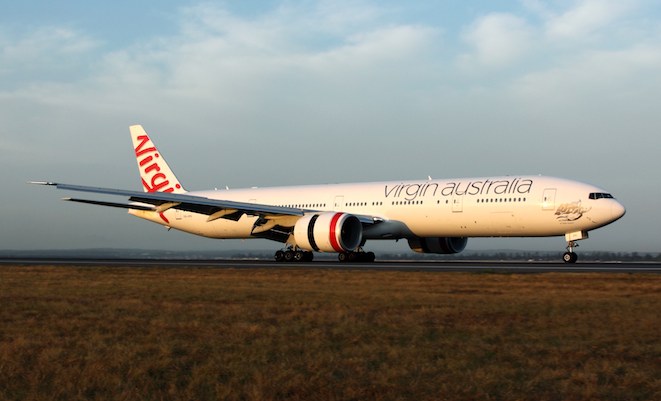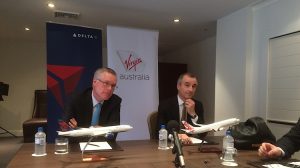
Australia’s competition regulator has given the green light for Virgin Australia and Delta Air Lines to maintain their joint-venture partnership on trans-Pacific routes for the next five years.
In a draft decision, the Australian Competition and Consumer Commission says it has granted interim authorisation for the two carriers to continue their alliance, arguing it would be benefit consumers.
“The ACCC accepts that this combined network is likely to be valued by travellers between Australia and the US, since the majority of such passengers connect from and/or to destinations behind and beyond the key gateway points,” ACCC Commissioner Jill Walker said in a statement on Thursday.
“This is reflected in the growing number of passengers utilising such connecting services.
“The ACCC considers that the alliance has resulted in enhanced products and services including increased and better online connections, access to each other’s frequencies, better schedule spread, loyalty program benefits, and improved lounge access.”
The ACCC said an integrated Virgin-Delta network would enable both carriers to compete more effectively with the likes of United and Qantas on Australia-US routes.
Virgin and Delta both offer a daily service from Sydney to Los Angeles, while Virgin also flies daily between Brisbane and Los Angeles.
The ACCC noted the combined Virgin and Delta market share on the Sydney-Los Angeles route of about 35 per cent increased the risk that some passengers might pay higher ticket prices with the alliance.
However, the Sydney-Los Angeles route had the greatest demand and the largest number of competitors, Dr Walker said. Qantas and United also fly between the NSW capital and Los Angeles.
“The ACCC has reached the view that the alliance is likely to result in public benefit that would outweigh the detriment to the public through any lessening of competition,” Dr Walker said.
Virgin chief executive John Borghetti welcomed the ACCC decision.
“We are committed to working with our partner Delta to boost tourism and continue to bring strong competition to trans-Pacific travel,” Borghetti said in a statement.
In January, Virgin and Delta applied for a 10-year authorisation for their alliance, covering codesharing on each other’s services, reciprocal frequent flyer benefits, the ability to coordinate prices, schedules and routes as well as share revenue under the concept of “metal neutrality”.

In March, Delta president Ed Bastian said the immediate objective of their trans-Pacific joint-venture was to consolidate existing routes rather than add new services.
Bastien told reporters during a visit to Sydney Delta and Virgin had grown market share quickly since their partnership began in 2009 and the focus was on making sure that market share matured before adding incremental capacity.
“Our service is only five years old and I think we would like to make certain over time that we grow from a solid base of partnership before adding more flights,” Bastien said on March 18.
“At the present time we are going to keep what we’ve got and see how we can grow the market over time.”
Submissions in response to the draft decision were due by June 26 2015.












